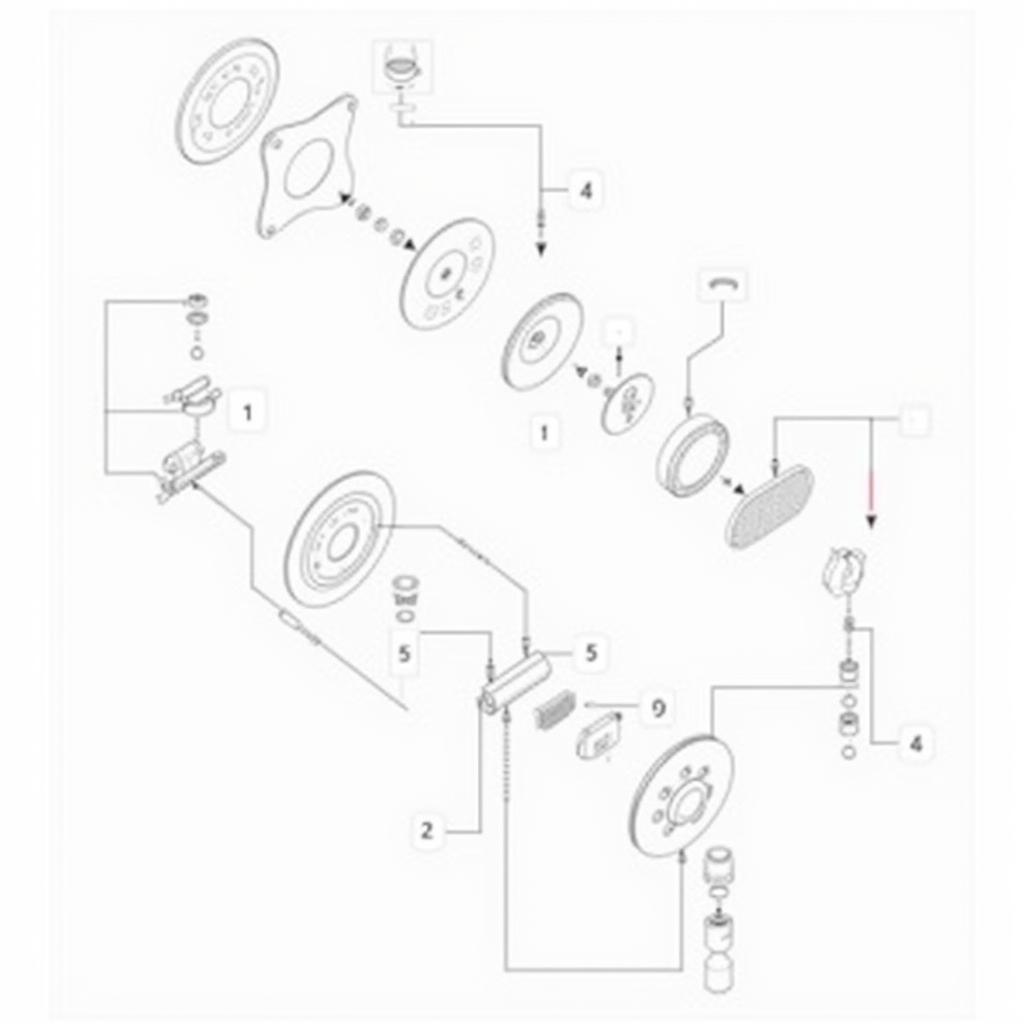If your Honda Civic is experiencing brake system issues and won’t start, you’re in the right place. This article explores the potential link between these two seemingly separate problems, offering troubleshooting steps and insights for Honda Civic owners, mechanics, and technicians alike. We’ll cover common brake system problems, their potential connection to starting issues, and how to diagnose and fix them effectively.
The brake system is crucial for safe vehicle operation, and any malfunction can be alarming. While a starting problem might seem unrelated, a few key connections can explain why your Honda Civic with brake troubles might not start. Let’s delve into the possibilities.
Common Honda Civic Brake System Issues
Honda Civics, like any vehicle, can experience various brake system issues. Some of the most common include:
- Worn brake pads: This is the most frequent brake problem, causing squealing or grinding noises and reduced braking effectiveness.
- Brake fluid leaks: Leaks can lead to a soft or spongy brake pedal and decreased stopping power.
- Faulty brake calipers: Calipers can seize, causing uneven braking, pulling to one side, and even overheating.
- ABS issues: Problems with the Anti-lock Braking System (ABS) can trigger warning lights and affect braking performance, especially on slippery surfaces.
- Master cylinder problems: A malfunctioning master cylinder can compromise the entire hydraulic system, leading to a loss of braking pressure.
Can Brake Problems Prevent Your Honda Civic from Starting?
While brake system problems don’t directly prevent the engine from starting, several indirect connections can cause this issue. One primary link is the brake shift interlock, a safety feature preventing the car from shifting out of park unless the brake pedal is pressed. If the brake light switch malfunctions, the car may not recognize that the brake is engaged, preventing it from starting.
Another less common scenario involves a severely depleted or contaminated brake fluid reservoir. While this won’t directly stop the engine from turning over, it can trigger warning lights and activate safety systems that may disable the starter.
 Honda Civic Brake System Components Diagram
Honda Civic Brake System Components Diagram
Troubleshooting Your Honda Civic’s Brake and Starting Problems
If your Honda Civic won’t start and you suspect a brake-related issue, follow these troubleshooting steps:
- Check the brake lights: If the brake lights aren’t working, the brake light switch is likely faulty, potentially preventing the car from starting.
- Inspect the brake fluid level: A low brake fluid level can trigger warning lights and potentially affect the starting system.
- Check the brake shift interlock: Try jiggling the shifter while pressing the brake pedal firmly. If the car starts, the interlock mechanism might need adjustment or replacement.
- Listen for unusual noises: Grinding or squealing from the brakes can indicate worn pads or other issues that should be addressed.
Why is My Honda Civic Making a Grinding Noise When Braking?
A grinding noise when braking is often a telltale sign of worn brake pads. The metal backing plate of the brake pad is contacting the rotor, creating the grinding sound. This needs immediate attention.
How to Fix a Honda Civic Brake Light Switch?
Replacing a faulty brake light switch is a relatively straightforward procedure. You can often find detailed instructions in your owner’s manual or online.
Expert Insights
John Davis, a seasoned automotive technician with over 20 years of experience, emphasizes, “The brake shift interlock is a common culprit in Honda Civics with starting problems related to the brakes. A simple switch replacement can often resolve the issue.” He also adds, “Regular brake system maintenance, including fluid flushes and pad replacements, can prevent many problems and ensure safe operation.”
Another expert, Maria Sanchez, a certified Honda specialist, adds, “Don’t ignore unusual brake noises or changes in pedal feel. These are early indicators of potential issues that should be addressed promptly to avoid more extensive and costly repairs.”
Conclusion
Brake system problems in your Honda Civic should never be ignored. While they might seem unrelated to starting issues, the brake shift interlock and other safety features can create a link. By understanding the common brake system issues, troubleshooting methods, and potential connections to starting problems, you can effectively diagnose and fix your Honda Civic. Remember, regular maintenance is key to preventing future issues and ensuring your safety on the road. For further assistance or expert advice, feel free to contact us at AutoTipPro at +1 (641) 206-8880. Our office is located at 500 N St Mary’s St, San Antonio, TX 78205, United States.
FAQ
- Can I drive my Honda Civic with worn brake pads? Driving with worn brake pads is extremely dangerous and can lead to rotor damage and reduced stopping power.
- How often should I change my Honda Civic’s brake fluid? Honda recommends changing the brake fluid every 30,000 miles or three years.
- What does the ABS light mean on my Honda Civic? The ABS light indicates a potential problem with the Anti-lock Braking System. While you can still brake, the ABS functionality may be compromised.
- How much does it cost to replace a Honda Civic brake light switch? Replacing a brake light switch is relatively inexpensive, typically costing between $20 and $50 for the part, plus labor if you choose professional installation.
- Can a low battery cause brake problems in a Honda Civic? While a low battery won’t directly cause brake problems, it can affect electronic systems, including the ABS, and potentially trigger warning lights.
- What should I do if my Honda Civic’s brakes feel spongy? Spongy brakes often indicate air in the brake lines or a problem with the master cylinder. This requires immediate attention.
- How do I bleed the brakes on a Honda Civic? Bleeding the brakes involves removing air from the brake lines. This is best done by a qualified mechanic, although DIY instructions are available online.





Leave a Reply